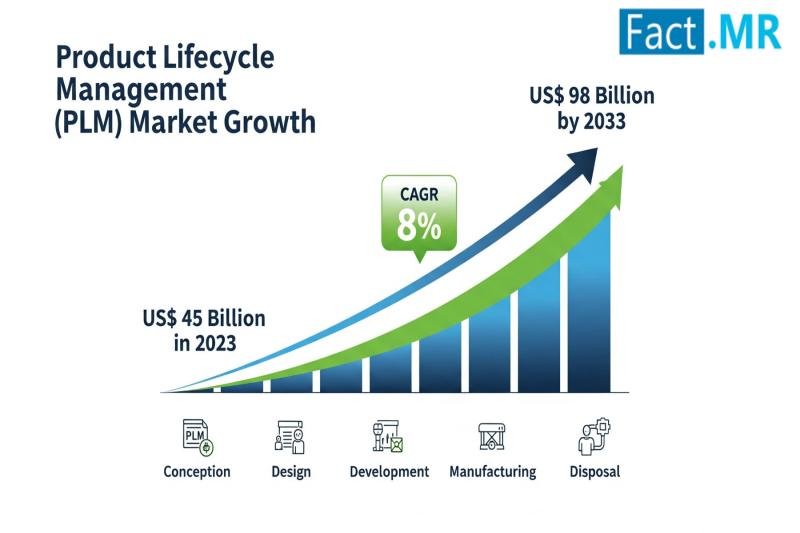Fact.MR today released its latest report on the Product Lifecycle Management (PLM) Market, providing comprehensive insights into the global market’s robust growth driven by the increasing need for streamlined product development, digital transformation, and advanced manufacturing processes. Valued at USD 45 billion in 2023, the market is projected to grow at a compound annual growth rate (CAGR) of 8%, reaching USD 98 billion by 2033.
For More Insights into the Market, Request a Sample of this Report: https://www.factmr.com/connectus/sample?flag=S&rep_id=8245
This expansion underscores the critical role of PLM solutions in optimizing product lifecycles, enhancing collaboration, and improving operational efficiency across industries like aerospace, automotive, and electronics.
Market Outlook and Growth Projections:
The product lifecycle management (PLM) market is poised for significant growth from 2023 to 2033, fueled by the rising adoption of digital tools to manage product development from ideation to retirement. PLM software and services enable organizations to integrate design, manufacturing, and supply chain processes, reducing time-to-market and costs.
The report projects the market to grow from USD 45 billion in 2023 to USD 98 billion by 2033, with a CAGR of 8%. This growth is driven by increasing demand for Industry 4.0 technologies, such as IoT, AI, and cloud computing, which enhance PLM capabilities for real-time collaboration and data-driven decision-making.
Key Drivers Fueling Market Demand:
The primary drivers of the PLM market include the rapid adoption of smart manufacturing and digital transformation initiatives across industries. The aerospace and defense sector, which held a significant market share in 2023, relies on PLM to manage complex product designs and comply with stringent regulations. The automotive industry is experiencing a surge in demand for PLM to support electric vehicle (EV) development and autonomous driving technologies, with global EV sales projected to reach 18.1 million by 2025.
The report highlights the growing integration of AI and IoT in PLM systems, enabling predictive maintenance and real-time product analytics. Additionally, the need to reduce product development costs, improve supply chain visibility, and meet sustainability goals is driving adoption, particularly in semiconductors and electronics, where rapid innovation cycles are critical.
Challenges and Restraints in the Sector:
Despite its strong outlook, the PLM market faces challenges that could hinder growth. High implementation costs and complexity of integrating PLM systems with existing enterprise software, such as ERP and CAD, pose barriers, particularly for small and medium-sized enterprises (SMEs). The report notes that a lack of skilled professionals to manage advanced PLM platforms can limit adoption in some regions. Data security concerns, especially with cloud-based PLM solutions, also require robust cybersecurity measures to comply with regulations like GDPR. Providers must address these challenges by offering scalable, user-friendly solutions and comprehensive training to ensure seamless adoption and data protection.
Segment-Wise Insights and Dominant Trends:
The report provides detailed segmentation analysis, identifying software as the dominant component, holding a 65% market share in 2023 due to its role in design, simulation, and collaboration. Services, including consulting and integration, are the fastest-growing segment, with a projected CAGR of 9.2%, driven by the need for customized implementation. By industry, aerospace and defense lead, followed by automotive and transportation, with the latter projected to grow at a CAGR of 8.5% due to EV and autonomous vehicle development. Key trends include the rise of cloud-based PLM platforms, which accounted for 30% of the market in 2022, and the integration of AI for predictive analytics and digital twins. The report also highlights the growing adoption of PLM in semiconductors and electronics to manage complex chip design cycles.
Regional Outlook and Growth Hotspots:
North America dominates the PLM market, holding a 35% share in 2023, driven by major players like PTC and Siemens, and high adoption of Industry 4.0 technologies in the U.S. Europe follows, with Germany and France leading due to strong automotive and aerospace sectors. The Asia-Pacific region is expected to exhibit the fastest growth, with a projected CAGR of 9%, fueled by rapid industrialization, digital transformation, and government support for smart manufacturing in China, India, and Japan. Latin America and the Middle East and Africa (MEA) are emerging markets, supported by increasing investments in manufacturing and technology infrastructure. The report identifies Asia-Pacific as a key growth engine due to its expanding industrial base and technology adoption.
Browse Full Report: https://www.factmr.com/report/product-lifecycle-management-plm-market
Recent Developments:
The PLM market has seen significant advancements in 2024 and early 2025. In 2024, Siemens expanded its Teamcenter X platform with AI-driven analytics, enhancing collaboration for automotive and aerospace clients. PTC launched Windchill+ in 2023, a cloud-native PLM solution, improving scalability for SMEs. Recent posts on X highlight partnerships like Dassault Systèmes’ collaboration with Airbus for digital twin integration, streamlining aerospace product development.
Additionally, the adoption of PLM for sustainable design, such as eco-friendly EV components, is gaining traction. In Asia, India’s manufacturing sector saw increased PLM adoption in 2024, supported by government initiatives like Make in India, driving digital transformation in electronics and automotive industries.
Key Players Insights:
Leading players in the PLM market are advancing innovation through strategic partnerships and product enhancements. Siemens AG dominates with its Teamcenter platform, integrating AI and IoT for smart manufacturing. PTC Inc. excels with Windchill, focusing on cloud-based solutions, while Dassault Systèmes leads with its 3DEXPERIENCE platform for digital twins.
Other key players, including SAP SE, Autodesk Inc., Oracle Corporation, Aras Corporation, and Infor, are investing in cloud PLM and AI-driven analytics. Recent developments include SAP’s 2024 integration of PLM with ERP for seamless supply chain management and Autodesk’s expansion of Fusion 360 for electronics design. These companies are pursuing acquisitions and collaborations to meet evolving industry demands, with strong growth projected through 2033.
Competitive Landscape:
The PLM market features a competitive ecosystem with key players driving innovation and market share. Companies profiled include Siemens AG, PTC Inc., Dassault Systèmes, SAP SE, Autodesk Inc., Oracle Corporation, Aras Corporation, and Infor. These firms lead in providing scalable, AI-driven PLM solutions for diverse industries. The report includes a detailed competition dashboard, benchmarking, and market share analysis, highlighting strategies such as product innovation, strategic alliances, and expansion into emerging markets. As the market evolves, these players are well-positioned to capitalize on opportunities in Industry 4.0 and sustainable design.
Strategic Recommendations and Future Implications:
Fact.MR’s report offers actionable recommendations, urging stakeholders to invest in cloud-based PLM, AI-driven analytics, and digital twin technologies to enhance product development efficiency. Providers should focus on user-friendly solutions for SMEs and expand in high-growth regions like Asia-Pacific. The study includes value chain analysis, PESTLE factors, and SWOT assessments to support strategic decision-making. As digital transformation and sustainability drive industry needs, PLM solutions will remain critical for optimizing product lifecycles and fostering innovation across global markets.
Fact.MR delivers comprehensive market reports and valuable business insights, uncovering trends, growth paths, and competitive landscapes. Committed to accuracy and reliability, Fact.MR empowers businesses with critical data and strategic recommendations, enhancing market positioning. With a global presence and experienced analysts, Fact.MR ensures reliable market intelligence, equipping clients to capitalize on opportunities.
Check out More Related Studies Published by Fact.MR:
Fitness Application Market https://www.factmr.com/report/fitness-applications-market
Predictive Maintenance Market https://www.factmr.com/report/predictive-maintenance-market
Non-Fungible Token (NFT) Market https://www.factmr.com/report/non-fungible-token-nft-market
Translation Services Market https://www.factmr.com/report/translation-services-market
Content Delivery Network (CDN) Market https://www.factmr.com/report/content-delivery-network-market
Sports Betting Market https://www.factmr.com/report/sports-betting-market
Enterprise Video Market https://www.factmr.com/report/enterprise-video-market
Digital Workplace Market https://www.factmr.com/report/digital-workplace-market
Contact:
US Sales Office
11140 Rockville Pike
Suite 400
Rockville, MD 20852
United States
Tel: +1 (628) 251-1583, +353-1-4434-232
Email: sales@factmr.com
About Fact.MR
We are a trusted research partner of 80% of fortune 1000 companies across the globe. We are consistently growing in the field of market research with more than 1000 reports published every year. The dedicated team of 400-plus analysts and consultants is committed to achieving the utmost level of our client’s satisfaction.
This release was published on openPR.

















